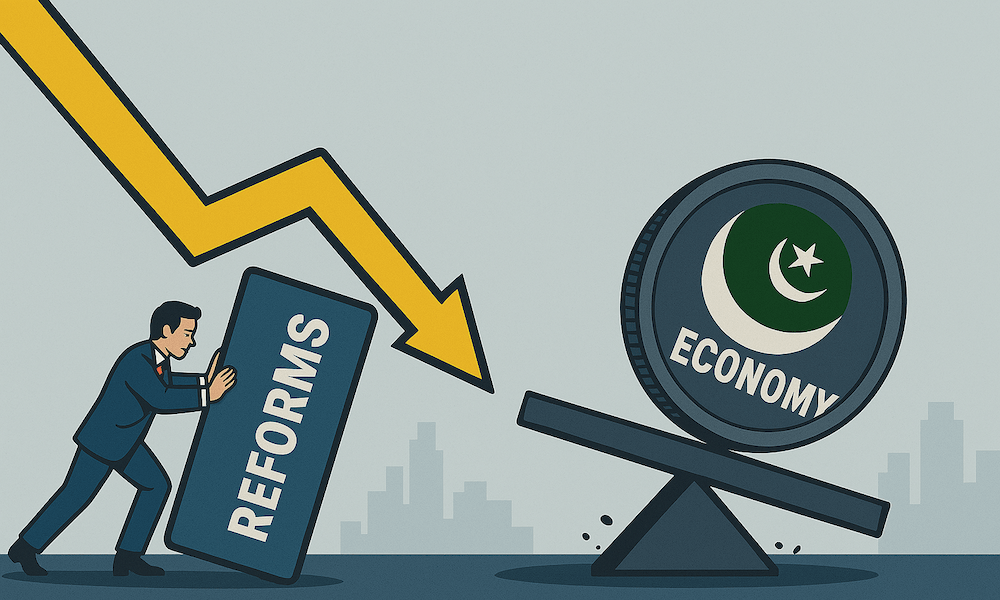
Muhammad Arif
Pakistan today stands at the edge of an unprecedented crisis — a crisis not merely of economics, but of governance, credibility, and sovereignty. While the International Monetary Fund (IMF) continues to dictate the contours of Pakistan’s fiscal and monetary policies, the country itself is sinking deeper into structural dysfunction. The narrative of “stabilisation” has become little more than a convenient mirage for both the government and its external lenders. Beneath the statistical optimism lies a nation where governance has collapsed, institutions have decayed, and public faith in the system has all but evaporated.
The economic pain inflicted by the recent floods remains fresh and far-reaching. Pakistan suffered massive losses as torrents destroyed infrastructure, crops, homes, and livelihoods across vast regions. The situation was further aggravated when India released large volumes of water during peak cloudbursts, knowing that Pakistan’s river basins were already under severe stress. That decision, reckless and indifferent to human suffering downstream, deepened the devastation and displaced millions. The cumulative impact of such disasters — both natural and political — continues to drag the economy into despair.
Meanwhile, Pakistan’s fiscal integrity is under serious question. The IMF itself has identified a discrepancy exceeding US$11 billion in Pakistan’s trade data — a gap so wide it calls into doubt the very credibility of our balance-of-payments figures. This revelation should have shocked the conscience of policymakers, but it merely exposed what many already suspected: data manipulation, institutional decay, and a governance structure run by vested interests rather than national interest. While the IMF asserts itself as a guardian of transparency and reform, it has failed to detect or prevent such massive malpractice under its own watch. The Fund’s silence on systemic corruption raises legitimate questions about its sincerity and about whether its policy enforcement is driven more by external political imperatives than by genuine concern for Pakistan’s economic future.
Let it also be clear that criticism of the IMF does not absolve Pakistan’s own rulers. Corruption in Pakistan has reached systemic proportions — no longer confined to individuals, but embedded deep within the machinery of governance itself. The ruling and bureaucratic elites have normalised rent-seeking, patronage, and misuse of authority at every level. Accountability mechanisms have deteriorated into selective instruments of power. Institutions that once safeguarded justice and transparency now appear compromised, influenced by political and extra-political forces. The judiciary, long considered a refuge for citizens against executive excess, is now widely perceived as constrained and aligned with prevailing power structures rather than the rule of law.
This institutional decay has bred cynicism and despair. Merit has been replaced by loyalty, policy by expediency, and justice by negotiation. The erosion of trust in governance is perhaps Pakistan’s deepest crisis — more destructive than fiscal deficits or trade imbalances. When citizens lose faith in the fairness of the system, even the most well-intentioned reforms cannot take root. The economy does not operate in a vacuum; it reflects the moral and administrative condition of the state itself.
The ongoing revelations of data manipulation and fiscal mismanagement only confirm what many Pakistanis already feel in their daily lives — that the system is not designed to serve them. The IMF’s micro-management of Pakistan’s economy has become both a symptom and a cause of this malaise. It intervenes in tariff design, taxation, and subsidies, yet remains indifferent to the plunder, misallocation, and systemic leakages that bleed the state dry. The Fund’s oversight, selective and self-serving, shields its own credibility while ignoring the deeper rot that sustains Pakistan’s dependency.
Energy consumption — a key indicator of economic health — continues to fall. This is not a sign of efficiency; it is evidence of contraction. Industries have shut down under the weight of exorbitant costs and erratic policies. Small and medium enterprises, the backbone of employment and innovation, are gasping for survival. When energy demand falls in an industrialising country, it signals not conservation but collapse — a shrinking economy that cannot afford to power itself.
Governance, corruption, and external manipulation together form a vicious triangle that Pakistan has failed to break. Successive governments have mortgaged national decision-making for short-term political survival, allowing external creditors and internal elites to dominate every sphere of policy. The result is a country where neither the IMF nor the state takes ownership of failure. The people — over 25 million of them living in poverty — continue to pay for the sins of both.
True sovereignty is not won by rhetoric or isolation. It comes through competence, integrity, and institutional independence. Pakistan must build a governance model grounded in transparency, economic discipline, and justice. It must establish credible systems for trade data, energy regulation, and fiscal reporting — not to appease the IMF, but to restore its own legitimacy.
Until Pakistan confronts internal corruption and external dependency with equal resolve, it will remain trapped in a cycle of deception, debt, and decline. Our challenge is not only to survive the next bailout but to rebuild a state capable of self-respect and self-governance.
The author is: former Member, OGRA, Mnaging Partner at Arif & Associates, a boutique petroleum and business law consultancy, is a thought leader in energy, governance, regulatory and economic policy reforms, ; [email protected] | 0333 5191381
(Views expressed by writers in this section are their own and do not necessarily reflect ‘World News AM’ point of view)


